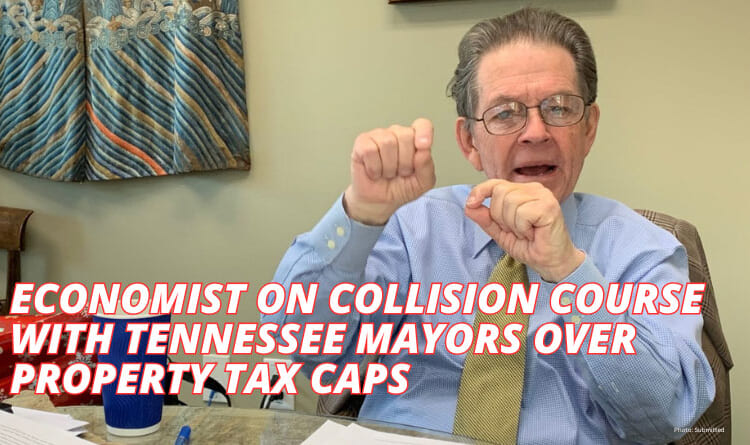Showdown brewing over county property tax caps.
Photo: Economist Art Laffer. (Photo: Submitted)
By Sam Stockard [Tennessee Lookout -CC BY-NC-ND 4.0] –
A battle is brewing in the General Assembly over caps on county property taxes.
Economist Art Laffer, an advisor to multiple Republican presidents, is pushing lawmakers to prevent large one-time county property taxes increases that he says stunt growth.
In contrast, county mayors across Tennessee say a cap could hamstring them as they try to cope with growth, particularly in the counties surrounding Nashville.
“This is the last big problem for creating prosperity here in Tennessee, to put guardrails on the property tax structure,” Laffer said in an interview at his office in West Nashville.
The supply-side economist known for the Laffer Curve said his proposal would cap property tax increases at 2% but allow for exceptions to pay off debt and enable voters to approve larger increases for a limited period of time. Sen. John Stevens, R-Huntingdon, and Rep. Ryan Williams, R-Cookeville, are carrying the bill, which is still being written.
Laffer contends every 1% increase in property taxes causes property values to fall by 1.3%. Thus, a study he put together shows Metro Nashville’s 34% property tax increase of 2020 started driving down property values and slowing growth. He argues property tax increases are especially damaging for inner cities and points to Memphis as a prime example with residential rates at 1.8% and commercial and industrial at nearly 3%, creating a spiral of tax increases and causing personal income to dwindle over the decades. Laffer’s study doesn’t factor in population shifts, demographics or the impact of local government services.
Metro Nashville, though, isn’t the only local government to escalate property taxes to deal with growth. The Rutherford County Commission raised its rate by 16% last year, on the heels of a 31-cent tax increase by the Maury County Commission when Republican U.S. Rep. Andy Ogles served as mayor in 2022.
Rutherford County Commissioner Phil Dodd acknowledges such a measure would keep local governments in check, compelling them to be extremely conservative but at the same time hampering their ability to make difficult budget decisions. He points out that county commissioners would need to raise the property tax by 2% every year just to make sure they don’t get into a bind.
“I hate the state telling us what we need,” Dodd said.
The bill remains under negotiations as each side jockeys for leverage.
Laffer’s TennCap, which is pushing the bill, is a new political group that appeared on the state’s lobbying database when it hired Nathan Poss and Katie Ashley from JohnsonPossKirby Government Relations in August of last year.
For the last six months of 2023, TennCap spent between $35,000 and $75,000 on lobbying, according to the state’s lobbying database.
The group’s registered address is an office suite in Alexandria, Virginia, used by various conservative political groups, including Gary Humble’s Tennessee Stands PAC and at least two national groups, the Fund for a Working Congress PAC and the Affordable Energy PAC.
Tax alternatives vary
Counties have a few options to raise revenue without state or voter approval outside of raising property taxes. Sales taxes are mostly capped at 9.75% and any increase in a hotel-motel tax requires lawmakers approval. Counties can enact without state approval a stormwater and adequate facilities fee.
For years, county leaders have pushed for the right to adopt an impact fee, but outside of a few counties that enacted in the early 2000s, the efforts have largely failed because of lobbying from the realtors and home builders associations.
That leaves the property tax as the main source of revenue for local governments, and Sen. Stevens said he hears from constituents worried about “extremely large” property tax increases in one year, mainly because of the massive bump in Metro Nashville. The Tennessee Comptroller’s Office was prepared to take over management of Metro Nashville’s budget before the 2020 tax increase, he noted.
“There’s a lot of concern and fear that as the economy is getting shakier and shakier, people are concerned that governments will continue to seek additional revenue,” Stevens said. “So it’s really a message to look internally and tighten your belt, make sure that it’s necessary and if necessary, it can be done responsibly and perhaps over time rather than put it off, put it off and do it all at once.”
But Stevens admits there could be some risk of handicapping county commissions, which are charged with funding law enforcement and other local government personnel. In addition, Stevens added any bill he sponsors would have to not affect bond ratings and the ability to borrow money.
Rep. Robert Stevens, R-Smyrna from Rutherford County, agrees a cap on property tax increases “very well could” hurt county commissions in their efforts to keep up with growth, even if their constituents support a cap.
“I don’t know what the bill says, but it could put a damper on fast-growing counties like that. Hopefully, they’ll get more revenue from the adequate facilities tax this year to help with that,” Stevens says.
Mayors across the state oppose Laffer’s bill, but they have to walk a tightrope between voters who don’t want to see their taxes go up and county commissioners charged with funding large capital projects such as jail additions and high school buildings.
About 95% of county budgets are non-discretionary, meaning commissioners are required to pay for schools, libraries, highway departments and law enforcement and criminal justice.
Similarly to others, Williamson County Mayor Rogers Anderson said he would have to see the bill’s details to give a thorough response.
“But on the surface, it doesn’t sound like a good idea if you’re tying the hands of cities and counties if there’s not other ways (to raise revenue),” Anderson said.
His biggest concern is the impact such a bill could have on county bond ratings, which affect county spending obligations and interest rates.
Laffer, though, says his plan would allow counties to make exceptions for bond expenditures. He also argues that impact fees and sales tax extensions would be more effective than large property tax increases.
Higher sales tax and impact fees are considered a more regressive tax than a property tax increase, impacting at a higher rate those with less income.
Lawmakers broached the topic last year in an Appropriations Subcommittee meeting, discussing the larger property tax increases statewide in the last few years, according to Rep. Williams.
“We’re just trying to figure out how to protect taxpayers,” Williams said. But he notes so many details are involved in tax laws, “you’ve gotta have a PhD to sort through it all.”

About the Author: Sam Stockard is a veteran Tennessee reporter and editor, having written for the Daily News Journal in Murfreesboro, where he served as lead editor when the paper won an award for being the state’s best Sunday newspaper two years in a row. He has led the Capitol Hill bureau for The Daily Memphian. His awards include Best Single Editorial from the Tennessee Press Association. Follow Stockard on Twitter @StockardSam













